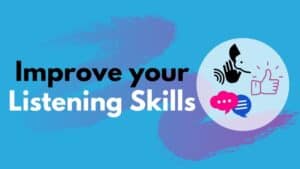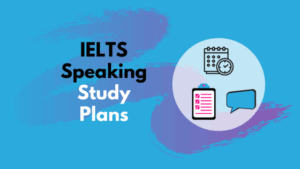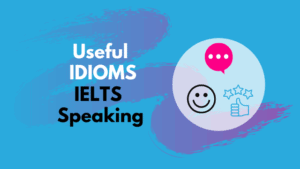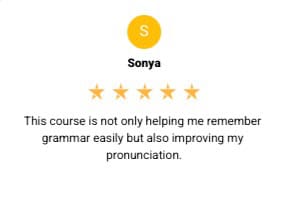Introduction
Phrasal verbs are fun, exciting and a wonderful opportunity to show your natural spoken English to the IELTS Speaking examiner.
In this article I am going to show you what phrasal verbs are, how exciting they are, why they are important in IELTS Speaking and 15 of my ‘favourite’ ones that will impress your IELTS examiner!
What you will learn
What are Phrasal Verbs?
Basically, a phrasal verb is when you have
Verb + preposition
For example,
- walk out of the room
- walk away from the cookie jar
- speak up, I can’t hear you
Prepositions give you the place, time or direction of the action and can include:
- in
- on
- under
- over
- out
- to
- from
- away
In some grammar books you will see a phrasal verb described as
Verb + adverb particle
For example,
- walk out of the meeting
- switch off the light
Basically the adverb particles are the same as prepositions (in, on, under, out, to…), but serve a slightly different function. Adverb particle tells you how you do the action.
In reality it doesn’t much matter what you call them, so long as you can understand the meaning and use them in your conversation.
Also note, sometimes a phrasal verb may have one preposition (or particle) but sometimes has two.
I need to cut down the tree (one preposition)
= chop the tree so it falls down
I need to cut down on my smoking (two prepositions)
= reduce how much I smoke
Phrasal Verbs can be Idiomatic
Phrasal verbs are challenging fun because they are often idiomatic!
So the meaning of the phrase is not the same as the individual words. For example,
Put off the meeting = postpone the meeting
Speak down to someone = to speak to someone like they are stupid, immature.
Now you might be thinking,
Keith, does that mean I can only use them in speaking?
Not at all, many are also used in writing.
However, how do you know which are used in writing and which are used in speaking?
Simple, by learning them in context!
So, if you see a word written, you know it can be used in writing, if you hear it spoken, you know it can be used in speaking.

Different Types of Phrasal Verbs
Phrasal verbs are complicated really interesting because of the word order!
Some are separable, meaning you if the verb has an object, that object (or thing) can go between the verb and preposition. It may also go after the preposition. For example,
To look up = to find the meaning of a word in a dictionary
I look a word up
I look up a word
If you choose to use ‘it’, instead of the object, you must put it between the verb and preposition.
I look it up
Some phrasal verbs are inseparable (like you and your dog, cat, partner; you don’t like being apart!).
So, you must always put the object at the end, after the preposition. For example,
Take after = resemble or look like a parent
I take after my father
I take after him
How do you know if a phrasal verb is separable or inseparable?
I’m afraid there are no rules.
English is so frustrating much fun!
You have to learn them by heart,
One by one
How lovely!
Pronunciation Tips
Phrasal verbs are tricky so exciting because they give you the chance to show off your control of pronunciation.
Notice, most phrasal verbs will be linked because many verbs end in a consonant sound and many prepositions start with a vowel sound. For instance,
Sit_up
Speak_up
Notice how the linking works with different forms and tenses:
I like to look_up new words
He looks_up words
She looked_it up
Phrasal Verbs in IELTS Speaking Part 1
Topic: Work and Study
1.Knuckle down = to start focussing on your work/study. (Inseparable)
I work as a teacher and we’ve got exams coming soon, so we all need to knuckle down.
I study law, and I have exams soon, so I need to knuckle down.
Part 1 question: Can you ____?
2.To get (a) round to = to do something you have intended to do, but not had time. (Inseparable)
Can you cook?
I would love learn how to cook, but I just have’t got round to it. I’ve been too busy.
Can you paint?
I like painting, but I cannot do it very well. I’ve just never got round to taking classes.
Hobbies
3.to while away = to spend time in a relaxed way. (Separable.)
I love to while away the afternoon watching movies
I love to while the evening away reading a good book
4.To brush up on = to improve a skill you haven’t practice for some time. (Inseparable)
I love playing the guitar, but I need to brush up on it because I haven’t played for several months.

IELTS Speaking Part 2
Describe a thing
5.To stumble upon = to find something by chance. (Inseparable)
I’d like to tell you about a great book that I stumbled upon recently
I’d like to tell you about a great _____ (film, restaurant, photo, painting…) that I stumbled upon recently
Describe a time when
6.To bump into = to meet someone by chance / accident. (Inseparable)
Recently I bumped into an old friend and ______
7.To turn out = to happen in a certain way. (Inseparable)
It was a difficult time, but in the end everything turned out just fine.
In the end, it all turned out well.
IELTS Speaking Part 3
How will ____ change in the future ?
8. To bank on = to expect and hope something will happen. (Inseparable)
I am banking on the COVID situation getting better next year.
Many governments are banking on the economy improving in the future
9. To be in for = to be about to have or experience. (Inseparable)
We are in for a few surprises next year.
Many real shops are in for a hard time next year, as more people choose to shop online.
10. To pan out = to result or develop in a certain way. (Inseparable)
I think things will get better, but we will have to see how things pan out
I think our goal of getting everyone vaccinated this year, isn’t going to pan out
11. To run up against = to face problems or difficult situations. (Inseparable)
I think we are going to run up against a lot of problems
We are going to run up against more crime in the future

What do you think of…?
12.To mull over = to think about something carefully . (Separable)
I’ve been mulling over this a lot recently and I think…
I was mulling this over recently and I think…
13. Figure out = to find the solution. (Separable)
It’s complicated and I don’t think it’s easy to figure out a solution
This is a tricky problem and it will take time to figure a good solution out
Do you agree that the government should_____?
14. Get on with = to start, or continue, doing something. (Inseparable)
The government talks about reducing the crime rate, but they just need to get on with it.
15.To buckle down = to start working hard. (Inseparable)
It’s time the government buckled down and found a solution
Why Phrasal Verbs are Important
Some phrasal verbs are only used in speaking and they are an extremely common feature of natural, native speaker like spoken English.
For example, you may write
‘I like to spend time with my friends’
But when speaking, it is more natural to say,
‘I like to hang out with my friends’
What’s more many of them are idiomatic, and the successful use of less common idiomatic vocabulary is a key feature of a and 7 or above in the IELTS Speaking Test.
So, you need to build up a base of basic ones, and if possible, some less common ones.
This will not only help you stand out in IELTS, but you need them to understand native speakers and to be able to interact naturally with them.
Which phrasal verb are going to learn and start using next? Let us know in the comments below.
Together we can learn from each other and grow as a community.






29 thoughts on “15 Phrasal verbs to impress the IELTS examiner”
Hi sir, myself Anushka. Sir your lessons are fantastic and really helpful, may you please help me for preparing for my IKLC ( International Kangaroo Linguistic Contest ) for grade 11?
Hi Keith, I’m so happy that I stumbled upon your YouTube channel yesterday. I’m immediately in love with your demeanor and your lessons. Just a question here. Do you think the phrasal verbs buckle down and knuckle down are interchangeable as I found their meaning is more or less similar? Please correct me if I’m wrong. 🤔
Very helpful for IELTS aspirants.!!
Thanks sir 😍
Pleased to haer that – thanks Hussain!
I watch your videos every day ,and trying to learn phrasal verbs by heart as you advise
Thanks a lot
You are great and you are my favourite teacher
Thanks for learning with me!
Pingback: 15 Phrasal verbs to impress your IELTS examiner – Opção Binária
I stumbled upon this Speaking Academy today and it’s a cut above the rest! Loving it, it appeals to me! Thanks a million, Keith, for creating this phenomenal channel!
Luiza
You are very welcome Luiza, thanks for stopping by and do visit again!
HI, Sir , I am learning from your YouTube videos. I am going to book a exam soon. Thank you so much sir.
You are welcome and best of luck with your exam!
Your lessons are extremely important to help people learning English. Your teaching is fantastic.
Thank you very much.
Very kind, thank you!
Is increasing my vocabulary bank more important than learning more phrasal verbs?
Yes, I would focus on increasing your overall vocabulary first. Phrasal verbs are just a small (but important) part of that.
Sir, can’t express how a splendid teaching is your! Incredible!
Very kind. Thank you so much.
Phrasal verbs are widely used in English speaking but it is a bit harder for non-native speakers like me who memorises a lot and can not use those at right time.
What should I do?
Just learn to use a few, and learn them step by step. You are right, they are challenging to use well, so only use them in the test, if you feel fairly confident you know how to use them.
You are doing a great job sir 👍👏
It really helped me a lot in learning English
Love from India🇮🇳
So glad to help – thanks!
Hi teacher, I’m glad to find your useful website by chance, I really love the way you are teaching. You made my day. Would you mind if I asked you to publish the related pdf for each lesson, then we could easily download the whole lessons and save it?
Thanks a million
All the live lessons have PDFs, but at the moment the blog posts don’t. However, it is a great idea, I will see what I can do!
Hi
It was really good and look like absolutely essential for everyone want to learn English, Especially in speaking.
But topic is a bit confusing for me and i think it need to spend more time to understand the whole topic.
Thank you so much
Thanks for your comment. I agree phrasal verbs is a big topic and there is plenty to learn.
See this as your first step into the ‘phrasal verb swimming pool’ and there are many places for you to go and swim, explore and learn
I need to carry on with my studies despite my tight schedule at work.
It’s tough to learn and study, but keep going, I will continue to support you!
Hi Keith. This video is perfect and on your YouTube channel, I found another one: “Understand Native English Speakers with this Advanced Listening Lesson”, only that I can’t find the pdf of that video. Actually, I’m not preparing for IELTS, I just want to improve the way how to understand native speakers or to be able to watch films without subtitles. Thank you.
Hi, thanks for the comment, yes, these posts don’t have PDF at the moment. I will see what I can do.
Keep studying and you will start understanding more and more!